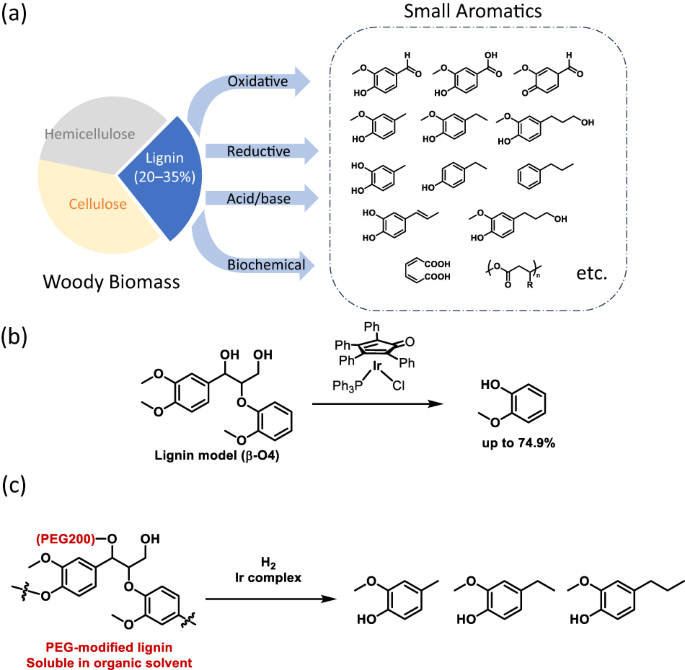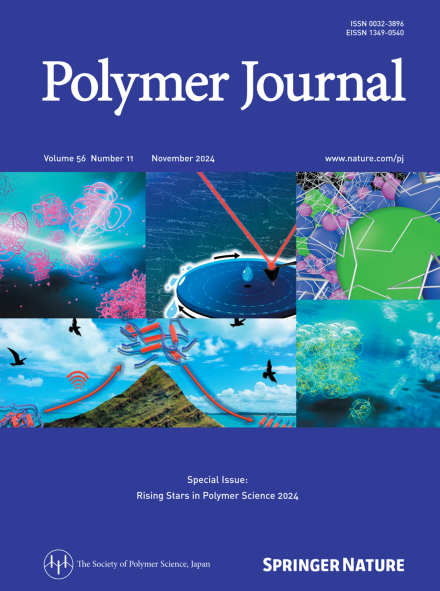PEG 功能化木质素的氢化降解
IF 2.3
4区 化学
Q3 POLYMER SCIENCE
引用次数: 0
摘要
将木质素转化为高附加值的基础化学品是实现高效碳循环的最重要技术之一。虽然已开发出许多用于裂解单木酚链节的催化体系,尤其是针对 β-O-4 结构的催化体系,但由于木质素的聚合物结构复杂,溶解度低,因此通常很难将这些催化过程应用于实际木质素衍生材料的降解。在此,我们用过渡金属复合物研究了聚乙二醇改性木质素的降解。降解产物为单木酚(4-甲基、4-乙基和 4-丙基愈创木酚)。虽然 PEG 分子脱离后的低溶解度阻碍了降解的高效进行,但添加 PEG 原位保护羟基可有效保持木质素的溶解度并提高单木酚的产量。本文章由计算机程序翻译,如有差异,请以英文原文为准。


Hydrogenative degradation of PEG-functionalized lignin
The valorization of lignin to value-added basic chemicals is one of the most important technologies for efficient carbon recycling. While many catalytic systems have been developed for cleavage of monolignol linkages, especially for β-O-4 structures, the low solubility of lignin, which originates from its complicated polymeric structure, often makes it difficult to apply these catalytic process to degradation of real lignin-derived materials. Here, we investigated the degradation of poly(ethylene glycol)-modified lignin with transition metal complexes. Monolignols (4-methyl, 4-ethyl- and 4-propyl-guaiacol) were obtained as the degradation products. Although low solubility after detachment of the PEG moiety hampered efficient degradation, the addition of PEG for in situ protection of the hydroxy group was effective in maintaining the lignin solubility and improving the monolignol yields. The hydrogenolysis of PEG-modified soluble lignin was investigated with series of transition metal complexes to afford alkyl guaiacols. Although the introduced PEG moiety was also susceptible against the hydrogenolysis, in situ modification in PEG solvent was found effective for maintaining the lignin soluble and improved degradation efficiency.
求助全文
通过发布文献求助,成功后即可免费获取论文全文。
去求助
来源期刊

Polymer Journal
化学-高分子科学
CiteScore
5.60
自引率
7.10%
发文量
131
审稿时长
2.5 months
期刊介绍:
Polymer Journal promotes research from all aspects of polymer science from anywhere in the world and aims to provide an integrated platform for scientific communication that assists the advancement of polymer science and related fields. The journal publishes Original Articles, Notes, Short Communications and Reviews.
Subject areas and topics of particular interest within the journal''s scope include, but are not limited to, those listed below:
Polymer synthesis and reactions
Polymer structures
Physical properties of polymers
Polymer surface and interfaces
Functional polymers
Supramolecular polymers
Self-assembled materials
Biopolymers and bio-related polymer materials
Polymer engineering.
 求助内容:
求助内容: 应助结果提醒方式:
应助结果提醒方式:


